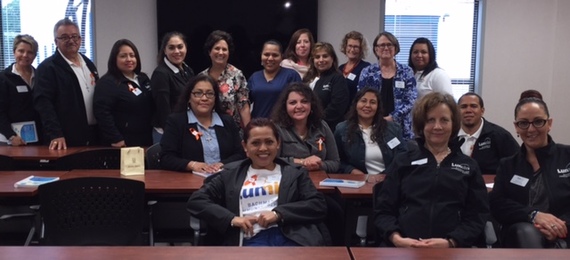This was a good week.
I had introduced a group of about 25 parent educators to the world of mindfulness, and this was our last session. Over six weekly meetings I covered the basics... but only barely. These teachers were busy, let me tell you! It was their school that had volunteered them to meet with me at the end of a long workday, and, while I'm sure many were thinking, "You've got to be kidding me... one more new thing!" they arrived each week with smiles on their faces, questions to ask, and a willingness to try something that was new to them.
Mindfulness meditation, a practice that is simple, secular, and scientifically supported, has the potential to help reduce stress and anxiety, emotional reactivity, negative thinking, and rumination; at the same time, it can improve your ability to sleep at night, increase focus and attention, overall health and well-being, and empathy for self and others.
True, I had to pick and choose topics carefully; I only had an hour for each session with these teachers. No way all the information could be included. So, I picked what I felt were the most important topics. And how did I determine what was most important? I chose the areas of mindfulness that most helped me return from a dark place when I had fallen down an emotional well:
- Mindful listening and mindful breathing provided strategies to turn off the yapping in my head. My mind used to almost drive me crazy, keeping me up until all hours of the night, blaming others, revisiting past conversations and thinking about what I should have said and what I was going to say the next time I saw the people involved. Never mind that those planned conversations often never had the opportunity to take place, or that the past conversations were exactly that... in the past! I had plans, my brain would tell me, and I was going to fix everything just right!!
- Body scans enabled me to continue what the mindful listening and breathing had begun: I was soon more in touch with my body and realized how it was impacted by the words and actions around me. I realized that, just as it takes about twenty minutes for my stomach to inform my brain that my stomach is full, it also takes time for my body to inform my brain when I am having negative emotional responses. I've now gotten to the point that I can sense "something" in my body so that I know I have an issue with which to deal. What a gift this has been! I notice the sensation, scan my environment to determine the issue, and approach it mindfully before ever getting to the point of some once-typical knee-jerk reaction.
- The realization that it is easier for someone to catch another person's mood before catching his or her cold, and that that mood can continue to affect three more tiers of interactions; I love that!
- The gifts of gratitude and appreciation. The ability to focus on these aspects in my life, and notice, many, many times each day, the wonders in my world.
Of course, I included more than these concepts during my six weeks with these educators... but, certainly, not enough... it would never be enough. Because, at the end of the day, I could just tell the teachers about mindfulness, discuss its potential, and the practices involved; it would up to them to actually take the time to practice mindfulness daily.
And there will never just BE enough time for a mindfulness practice; you have to be willing to make the time and take the time for mindfulness. This simple practice that has the potential to bring more good things to your world than you could possibly imagine... it is simple, yes, but that is not the same thing as easy.
It's not so easy to maintain a practice, and it's all in the hands of those teachers. When I started practicing mindfulness I thought I was worth the time and effort needed; I hope those teachers think they are, too.
